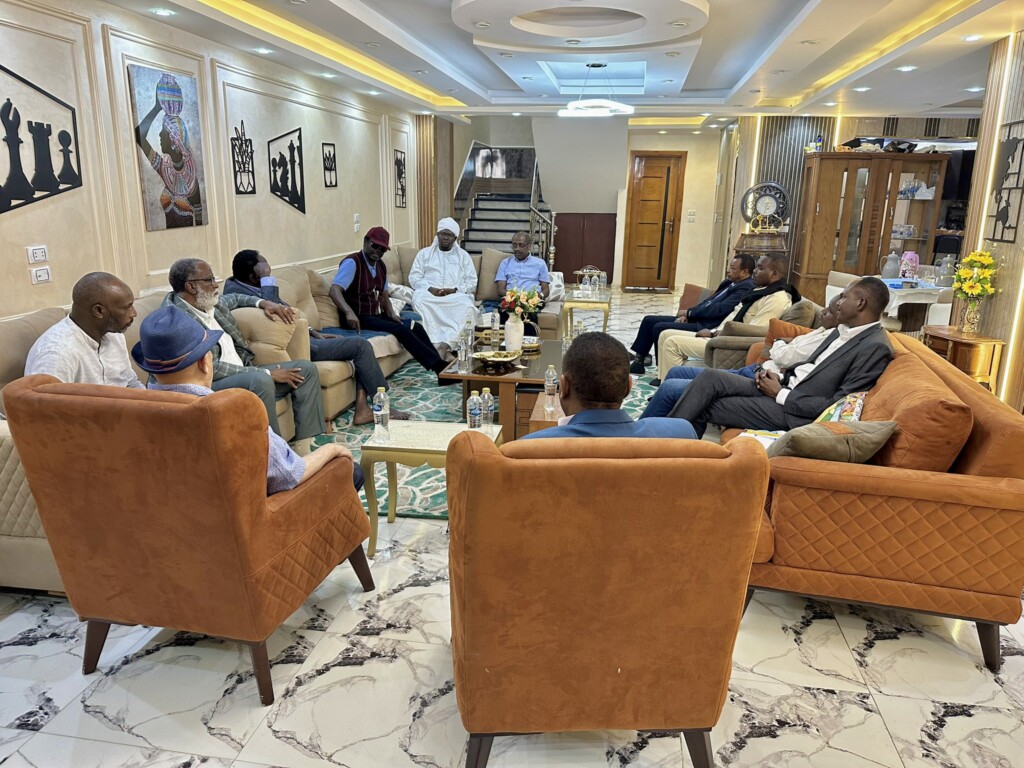Sudan: FFC-DB convenes in Cairo, calls for global action to open vital aid routes

Members of the FFC-DB during a meeting led by Minni Minawi (seen wearing a red cap) in Cairo, the capital of Egypt, yesterday (Photo @MubarakArdol via X).jpeg
The Political Communication Committee of the Forces for Freedom and Change-Democratic Bloc (FFC-DB) held a meeting in Cairo, the capital of Egypt, yesterday, chaired by Darfur Governor Minni Minawi, who also serves as the committee’s chairperson. Several other leaders from the FFC-DB also attended the meeting.
According to a statement issued yesterday by FFC-DB* spokesperson Mohamed Zakariya, a briefing was provided on the bloc’s participation in several international meetings, including discussions in Switzerland, the African Union conference in Addis Ababa, and a meeting with United States envoy Tom Perriello.
The Democratic Bloc condemned “indiscriminate attacks by the Rapid Support Forces (RSF) militia” against civilians in El Fasher, Sennar, and other areas. “The attacks targeted humanitarian and commercial convoys in El Fasher, South Kordofan (Nuba Mountains), El Gezira, and Sennar”, according to the statement.
The FFC-DB welcomed the government’s decision to open the Adré crossing with Chad, and emphasised the need for increased international pressure to open humanitarian routes, “particularly the Kosti-El Obeid-Kadugli road and the El Obeid-En Nahud-El Fasher road”, to ensure humanitarian aid delivery to affected communities.
Attendees reaffirmed their full support for the Sudanese Armed Forces (SAF), the Darfur Joint Forces, and the National Movement Forces (NMF), praising their “victories and resilience in the face of ongoing challenges”.
The Bloc commended the efforts of the Sudanese diaspora, “especially demonstrations in front of the Human Rights Council meetings in Geneva”. It called for the strengthening of popular movement “to pressure Western parliaments into condemning the actions of the RSF”, and expressed solidarity with the displaced, refugees, and those affected by the recent floods in the country.
The FFC-DB agreed to follow up on the outcomes of the Addis Ababa meeting regarding a comprehensive inter-Sudanese dialogue, with the goal of finding a sustainable solution to the ongoing crisis. They also submitted a recommendation to the Democratic Bloc’s leadership body to convene and address organisational and political issues.
In May, following a meeting organised by the FFC-DB in Cairo, 48 Sudanese political and civil blocs signed a charter outlining their vision to manage the transitional period after the war.
* The FFC-DB was formed in November 2022*, and consists of two Darfur rebel movements that backed the SAF-RSF coup d’etat in October 2021 (the Justice and Equality Movement (JEM) led by Jibril Ibrahim, the Sudan Liberation Movement split-off faction headed by Minni Minawi (SLM-MM), the Democratic Justice Alliance chaired by former rebel leader Mubarak Ardol, and the mainstream Democratic Unionist Party in early November last year. The alliance also includes the Republican Party, the Beja Nazirs Council wing chaired by Sayed Tirik, the National Movement Forces coalition of former Darfur leader El Tijani Sese, and a number of split-off groups from mainstream political parties. The mainstream FFC (FFC-Central Council) earlier refused to cooperate with “parties that are not interested in democracy” such as the members of the Democratic Bloc.











 and then
and then